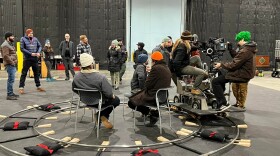It seems especially timely after a year of racial unrest that a new play brings to light the life of someone who fought so hard for equality. Seattle playwright Cheryl West has written a new play called "Fannie," which highlights the life of activist Fannie Lou Hamer. I spoke to her about the play and Hamer's legacy.
Cheryl West: Fannie Lou Hamer saw her first lynching when she was 8 years old. That had a profound effect on her. A man that she knew spoke up, that he wasn't getting paid what he was due, and they lynched him. And when she saw that, I think that there's something that changed in her, that she wanted to do something one day that would make sure that people did not have to accept that as a fate, that we could speak up, we could fight back.
And the best tool, she thought, to fight back with was voting. She always said, "I wanted to have the right to vote so we could vote bad people out of office." She was 44 years old before she even knew she had a right to vote. That's amazing. And from 44 on for the next decade and a half, that's all she did. She worked for SNCC, the Student Nonviolent Coordinating Committee, that paid $10 a week when they had it, the oldest field worker. And she was going door to door telling people we have to vote if we want change, we want better living conditions. If we want anything that will empower us, we have to be able to put our own people in office. And so that was her biggest message.
Kevin Kniestedt: She wasn't wealthy. She wasn't terribly well educated. Does this kind of make her prominence and success as an activist even more impressive?
CW: Oh, absolutely. She had a sixth-grade education, but she's one of the best grassroots leaders that our country has ever produced. When she started out, only 5 percent of Black voters in Mississippi were registered. By the time she died, it was over 70 percent.
KK: What sort of legacy did she leave?
CW: I think when we hear someone like Kamala Harris say, "She is my hero, and I wouldn't be here today as vice president if it hadn’t been for Fannie Lou Hamer," what a legacy that is for the first Black vice president to be inspired by the life of Fannie Lou Hamer.
KK: I suppose there's never a bad time for a play like "Fannie" to remind us of a person who fought so hard for the rights of African-Americans. But this seems especially timely right now considering the events of the last year.
CW: I would say exactly, Kevin. I think that she … I know people have asked me in interviews, what would she think about where we are today? And I think that she would feel disappointed that we haven't gotten a little bit further along in our quest for justice and equality, and yet she would think that people are still out there working together. There are people still raising their voices for change and justice. We can look at the events of this summer with Black Lives Matter and see how many people took to the street -- Black, white, Asian, Hispanic. People raised their voices, and they were largely peaceful protests and thousands, thousands in every city all over the globe. That's inspiring.
So sometimes I think we spend more time thinking about what didn't happen or what hasn't happened yet. But we have to also give recognition to the inroads that we have had and that to see all those young people out in the street say enough is enough. I think that would make Fannie Lou Hamer very happy because that's what she believed in. She believed in taking it to the streets. She believed in knocking on doors and saying, "We don't have to take this." And she also believed in that the idea that Black and white could work together to make change and to make a country that we can all be proud of.
KK: From what I know, she also seems like a person that would say this is no time to let up, no time to take her foot off the gas.
CW: Exactly. This is no time to rest, and it's no time to despair. Toni Morrison has a quote about it's not the time to wring your hands; this is the time artists get busy. And this is the time where artists and activists and people who are in the business of healing this country get busy. And whatever your gift is, how can you share that with the world to make things better?
KK: What kind of takeaways do you hope people have after watching the performance?
CW: I think we're going to see, I mean, E. Faye Butler is so passionate and so compelling as Fannie Lou Hamer. … I think you're going to see a woman's story that still resonates today. And I think what people come away with is, what can I do? What action can I take? It might be something like who can I take a meal to down the street? What kid can I read to right now who's on remote learning? Little actions lead to bigger actions, and the cumulative effect of that will make change. And so I think that in looking at this performance, you will see the passion, you will see how she started and where she ended up because she was on a mission, and she was on a mission to change her circumstances and the circumstances of her neighbor. This was a woman that really believed in giving back, but she would also give you a lecture in a minute and tell you, OK, what are you going to do to help somebody next? So she always felt like I give, now you give, and we pay it forward. Fannie Lou Hamer was about we are better than this.
Cheryl West wrote the new play "Fannie," which is part of the Seattle Rep's five-part "Plays in Process" series, where the artists behind the show virtually offer audiences some glimpses into the creation of the play. That's happening Thursday, January 28, at 7:30 p.m.







